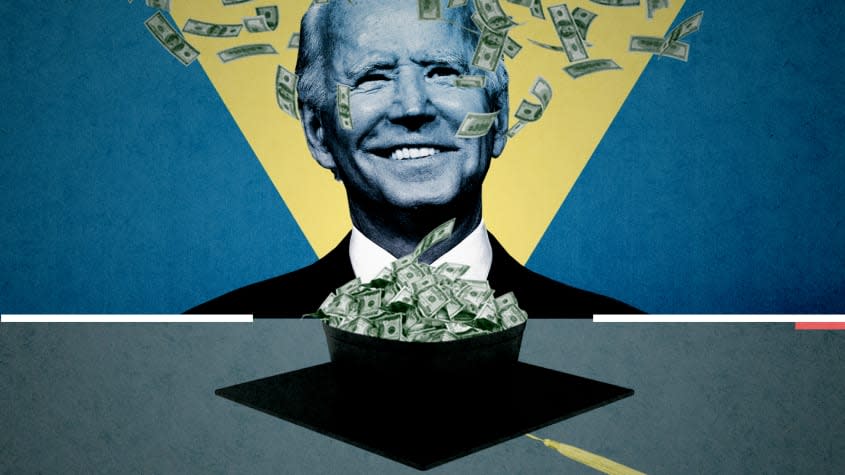Was canceling student debt a good move by Biden?

President Biden on Wednesday announced the details of a highly-anticipated plan to forgive up to $10,000 in federal student loan debt for borrowers making under $125,000 a year. For Pell Grant recipients under that same earnings threshold, the benefit is even greater — $20,000 in debt, wiped away. While some progressive Democrats are cheering the long-requested forgiveness, other party members, as well as Republicans, are criticizing the policy as reckless, expensive, and a transparent last-ditch attempt at buying votes before the midterms. Here's a look at how the latest columns and editorials are parsing the news:
It's good!
For many opinion columnists, the administration's decision is one deserving of celebration and praise, even if the relief is not as robust as originally desired.
"Given how likely it seemed that we'd see no action at all before the midterms, or during the Biden administration at all, I'm pleased with this course of action," wrote MSNBC's Hayes Brown. "It lays the groundwork for even more substantial relief in the future" and will unburden — even if slightly — "some of the people who've been ground down the furthest under their student loans. … I'm going to mark this down as a solid B+ on the White House's report card."
Plus, added Gregory Sarafan for The Philadelphia Inquirer, this decision is more so "about the small borrowers," whose "lives are about to be immeasurably changed, for the better." It might not seem fair, or enough, but "forgiveness is what we have for now, and we should be thankful for it, while also recognizing that it is just a starting place for future reforms." That there was suffering in the past is no reason the present must meet the same fate.
The Washington Post columnist Paul Waldman agreed: "What the administration is doing now is at least a start" in solving the college affordability crisis. Even if it's not the $50,000 or more per borrower that other Democrats had asked for, the new plan "will definitely improve the lives of millions."
And that's all also without mentioning that the relief is targeted to those "who really need it," without serving a "big giveaway to those who ran up big debts on expensive and valuable degrees," economist Dean Baker argued for Newsweek. Again, "the Biden administration's debt forgiveness plan is not perfect, but it is a big step that will help tens of millions of people. That's pretty good for government work."
It's very bad
Well, the Bloomberg Opinion Editorial Board, for one, was not impressed: "The best that can be said for President Biden's debt-relief plan is that it could have been worse." In one fell swoop, "Biden has undermined any commitment to fiscal discipline, reinforced his party's reputation for catering to elites, created a significant moral hazard, and likely made higher education less affordable for a generation," the board mused. And it seems obvious, given likely legal challenges to the policy, that the administration's goals here are "more political than practical."
The Washington Post Editorial Board saw things similarly: "Widely canceling student loan debt is regressive," the board said. It's "expensive," and "likely inflationary," and "takes money from the broader tax base … to subsidize the education debt of people with valuable degrees."
Worse yet, added the board at The National Review, Biden has, in authorizing the forgiveness, "allowed himself to be bullied into violating the Constitution" on debt relief proponents' behalf. He has "taken what was supposed to be a loan and turned it into a gift," while "yet again" abusing "emergency powers to pursue a reckless and senseless policy." "The U.S. president is not an omnipotent genie placed behind the Resolute desk to grant partisan wishes by the stroke of his pen," the board concluded.
It's suspiciously convenient ...
For some, like Brad Polumbo for Newsweek, the timing of Biden's new forgiveness policy smells an awful lot like a "political bribe for young voters" ahead of the November election. "With the midterms months away and Democrats cratering in the polls, Biden seems to be making the cynical political calculation that his band-aid 'solution' can buy his party a few votes," Polumbo argued. "That's shrewd politicking. But it's no way to run a country."
It's not enough
"With the simple stroke of a pen, President Biden has the unique opportunity to unlock financial freedom for countless Black Americans and low-income communities," the NAACP's Derrick Johnson and Wisdom Cole mused for CNN, just hours before the president's proclamation. But forgiving just $10,000 per borrower will "do little to help."
Student loans disproportionately affect Black Americans, who lack the same intergenerational wealth as white Americans thanks to "discriminatory practices in education, homeownership and employment," Johnson and Cole argued. And forgiveness at a minimum of $50,000 per borrower "is what is necessary to make a meaningful difference."
Further, even if you are in support of the newly-announced $10,000 in forgiveness, the Biden plan "does nothing to address the root causes" of the debt crisis, mused Washington Examiner contributor Kimberly Ross. It's a "short-sighted" bailout that will bring "long-term individual and collective pain" without so much as addressing "predatory university administrations or the exorbitant amounts they charge."
"The focus is entirely off of the parties that should be most on the hook for it," Ross continued. "So, thanks to Biden and his team, the cycle will only continue. No reforms made, no lessons learned, just righteous outrage at the weight that's been repositioned."
You may also like
Why Russia's efforts to replenish its depleted armed forces may not matter much in Ukraine

